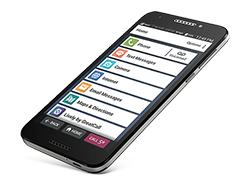3 Types of Reverse Mortgages:
1. Home equity conversion mortgages
A home equity conversion mortgage or HECM (pronounced “heck ‘em”) is the only type of reverse mortgage that’s backed by the Federal Housing Authority. Available through FHA-approved lenders, HECM reverse mortgages are the most common type of reverse mortgages. HECM loans give borrowers the largest amount of money; upper limits are based on the borrower’s age and the amount of equity he or she has in the home. With a HECM, the borrower continues to pay insurance premiums. Borrowers can use the money from a HECM for any purpose they wish.
On the other hand, a HECM for Purchase is a similar type of loan that leverages the borrower’s old equity to finance a new house. HECM for Purchase loans do not require monthly mortgage payments, but they do require that you keep up with mortgage insurance premiums and property taxes. Common reasons to consider a HECM for purchase loan include downsizing into a smaller home, moving closer to friends or family and transitioning into a retirement community.
2. Proprietary reverse mortgages
Private lending companies sometimes offer proprietary reverse mortgages. Proprietary reverse mortgage loans can provide a larger payout than HECMs since they are not beholden to FHA regulations, but they also tend to be more expensive since they are not insured by a government agency. Proprietary reverse mortgage lenders do still require a financial evaluation and credit counseling. Homeowners seeking a reverse mortgage would consider a proprietary reverse mortgage if their home isn’t up to FHA codes or if their homes are currently worth more than $1 million.
Reverse mortgages that aren’t insured by the government aren’t beholden to as strict of regulations, for better or worse. Some financial institutions are able to extend certain proprietary reverse mortgage products to homeowners as young as 60, but those fees won’t be as regulated or capped by a government agency.
3. Single-purpose reverse mortgages
Also referred to as a property-tax deferral program or deferred payment loans, single-purpose reverse mortgage loans are available to eligible homeowners who need to take out a one-time lump sum against their equity. Single-purpose reverse mortgage lenders usually don’t charge origination fees and closing costs are minimal, which is good since most people take out single-purpose reverse mortgages out of desperation.
Unlike HECM and proprietary reverse mortgage loans, which can be used for anything, funds acquired through single-purpose reverse mortgages must be used for a lender-approved expense, most typically to pay property taxes or to make a crucial home repair. Like other reverse mortgage programs, the loan is due when you sell the property, pass away or stop paying homeowner’s insurance.
Answering Common Questions about Reverse Mortgages:
How much money do you get from a reverse mortgage?
The initial principal limit, or total amount, that you’ll be able to borrow against your home through any reverse mortgage is determined primarily by the value of your home, your age and current interest rates. The maximum loan amount anyone can access through a reverse mortgage is capped by the FHA at $726,525 for federally insured reserve mortgages or home equity conversion mortgages in 2019. Since proprietary reverse mortgages are issued by private lenders, they are not capped.
Generally, you’ll need more than 50 percent in equity, or more than half your mortgage balance paid, to be eligible for a significant reverse mortgage loan. The more your home is currently worth, the more funds you’ll be able to access through a reverse mortgage.
The older the borrower is when he or she takes out the reverse mortgage, the more loan proceeds he or she is entitled to. People over the age of 75 tend to get much higher loan payments, and many use the money to finance new experiences during their later years. Current interest rates also will affect how much you’ll be able to take out with a reverse mortgage. Generally, the lower interest rates are the more funds you’ll have available to you through a mortgage loan.
What is the interest rate on a reverse mortgage?
Interest rates for reverse mortgages have historically fluctuated between 3–6 percent. Similar to traditional mortgage loans, reverse mortgages are available with fixed or variable rates and are determined by government agencies, investors and competitors. All types of reverse mortgage loans defer interest payments until the loan is due.
Most borrowers opt for fixed rates because they are less risky. The drawback with a fixed rate is that funds must be awarded as a lump sum. If you’re more interested in regular reverse mortgage payments that will supplement your monthly income, you may have to get a variable rate reverse mortgage. Variable interest rates are set by market-based indexes and can change either monthly or yearly.
How do you pay back a reverse mortgage?
Reverse mortgages become payable at the end of the life of the loan. Borrowers, or their heirs, will be liable for the full payment once the loan ends due to borrower’s death, relocation or failure to maintain the home or keep up with property taxes and servicing fees. The borrower or their estate will have the option of selling the house and turning over proceeds to the reverse mortgage lender or repaying the loan with other funds if they want to keep the house.
The debt limit for any mortgage is the total amount of debt the borrower incurs. It includes all loan amounts, interest payments and financing fees. It’s important to remember that the total amount you borrow with a reverse mortgage is based on how much equity is in the home, and so the lender cannot demand more from a borrower in repayments than the home is worth. Likewise, if the debt limit is less than the total value of the home at the time the borrower pays it off, the borrower gets to keep the surplus.
Who should get a reverse mortgage?
Reverse mortgages are available to homeowners who are over the age of 62 and own their homes outright or have minimal remaining mortgage balances. A lot of people think of reverse mortgages as a last resort source of income, but they can also be an important factor in planning your retirement or if you’re already retired and your house is your most valuable asset.
- If you don’t plan to move
Since a change of permanent residency triggers reverse mortgage repayment obligations, reverse mortgages are really only a good idea if you plan to age in place. - If you’re on a fixed income
Many seniors who depend on a fixed income from Social Security or other retirement programs use reverse mortgages to supplement their income. Often a person will get a reverse mortgage to pay off their existing mortgage and use the savings for extra cash every month. - If you can afford to maintain ongoing costs
Reverse mortgages require borrowers to pay costs associated with property taxes, insurance and maintaining the residence, as well as a servicing fee, which is typically paid to the lender monthly. Otherwise, you’ll be at risk for default and foreclosure on the home. - If you expect your house’s value to rise
If your kids sell your house after you die to pay off the reverse mortgage loan, they can keep the surplus of the sale. If your property value rises in the last several years of your life, your kids could actually see an increase in their inheritance.
What happens when you die with a reverse mortgage?
After you die, your family or estate will inherit your remaining equity and be responsible for repaying the reverse mortgage debt. Generally, they will have about six months to repay the loan outright or sell the property to recoup the balance. If the house is sold for more than the loan balance, your family will keep the difference. Alternatively, if the home sells for less than is needed to repay the loan, your family probably won’t be held financially responsible. For federally insured reverse mortgages, FHA Mortgage Insurance will cover the difference.
If you’re married, your spouse can continue to live in the house only if you were married before you took out the reverse mortgage and he or she was listed as a “nonborrowing spouse” in your reverse mortgage documents. If your spouse turns 62 after your death, he or she will likely have to refinance with their own reverse mortgage to keep living on the property.
Is a reverse mortgage a ripoff?
Often in a reverse mortgage scam, the victim is already acquainted with the scammer, but some lenders purposely mislead prospective borrowers too, which is why it’s so important to read verified customer reviews as you’re comparing lenders. Reverse mortgage fraud is a type of equity scam when a perpetrator convinces a senior to take out a reverse mortgage against their best interests for some kind of personal financial gain.
In the last several years, more regulations and stricter requirements on HECM programs from the Department of Housing and Urban Development (HUD) and the Federal Housing Administration (FHA) protect high-risk borrowers from default. For example, defaults on new reverse mortgage loans decreased by almost 75 percent after underwriting standards started setting aside some of the borrowed funds to cover future costs associated with the loan. Before you can be approved for a reverse mortgage, you’re also now required to meet with a third-party financial expert or reverse mortgage counseling agency to evaluate your financial situation and be sure you fully understand the loan program for which your applying.

Michele Lerner, author of “HOMEBUYING: Tough Times, First Time, Any Time”, has been writing about personal finance and real estate for more than two decades. Michele writes for regional, national and international publications in print and online for a variety of audiences including consumers, real estate investors, business owners and real estate professionals.












